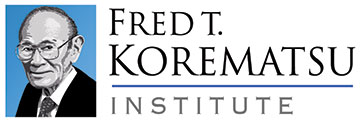2022 Day of Remembrance Statement
I thought what the military was doing was unconstitutional. I was really upset because I was branded as an enemy alien when I’m an American.”—Fred T. Korematsu
80 years ago today on February 19, 1942, President Franklin Roosevelt signed Executive Order 9066, “Authorizing the Secretary of War to Prescribe Military Areas.” Following the attacks on Pearl Harbor on December 7, 1941, the order stated the need for “protection against espionage and against sabotage.” The result? Over 120,000 people of Japanese ancestry, 2/3 of whom were American citizens, were sent to detention centers and incarceration sites without cause, without trial, and without recompense. This led to heartbreak, humiliation, and the loss of livelihoods, communities, and history. It also created an invisible division between Americans. Between those who “belonged” and those who were “other.” There were no cases or charges of espionage or sabotage or sedition against any Japanese Americans who were taken from their homes and incarcerated in camps across America.
Coming full circle, in 2021, the Roosevelt Institute acknowledged the mistakes of the past and the injustice of Executive Order 9066. “We publicly acknowledge the harm FDR’s policy decisions caused the Japanese American community, and by extension, all Americans.” For the first time in their 39-year history, the Institute’s Four Freedoms Awards, created to honor “achievements that have demonstrated a commitment to those principles which President Roosevelt proclaimed in his historic speech to Congress on January 6, 1941, as essential to democracy: freedom of speech and expression, freedom of worship, freedom from want, freedom from fear” had a central theme focused on racial justice. In addition to other notable voices, they awarded the Freedom Medal posthumously to my father, Fred T. Korematsu, who directly challenged President Roosevelt’s policy and Executive Order 9066 all the way to the United States Supreme Court.
Although the Roosevelt Institute took this notable step to address this offense, unfortunately, 80 years after E.O. 9066, racial discrimination and alarming accounts of racist language and anti-AAPI violence, antisemitism, anti-Muslim hate speech – those invisible divisions where some Americans are seen as “the other” despite our shared country of residence – are on the rise, far from eradication. To only acknowledge is not good enough anymore, we need to call out a wrong when we see a wrong. We need to shut down hate speech, racist language and calls to “go back where you came from” in real-time. My father, Fred T. Korematsu, said, “stand up for what is right, and don’t be afraid to speak up.”
A good first step is to acknowledge that the mistakes of the past can create an opportunity to educate people so we don’t repeat the same mistakes. We can eradicate ignorance, prejudice, and intolerance with education. There are currently alarming attempts across the country to sanitize and expunge moments in our collective history by banning books and removing anything unpleasant or hard to discuss or even harder to understand from classroom curricula. The impact of “manifest destiny” on Native American and indigenous peoples of the United States, slavery and Jim Crow, and the incarceration of American citizens because of “race prejudice, war hysteria, and a failure of political leadership” should not be erased from our history books.
One of the reasons we established the Fred T. Korematsu Institute was to emphasize the importance of civics education and civil liberties. Today, we are a national education advocacy organization. Our overarching mission is to advocate for education to advance racial equity, social justice, and human rights for all. In today’s current climate, our work feels more vital than ever before. On this Day of Remembrance, let us reflect on the dark history and injustice of this day, but also look forward towards a future where we never allow the same fear and ignorance to fester and allow us to make the same terrible mistake again. Let us all commit to working together to educate for equal rights and justice for all and for a future we can all be proud to share.
Read the Roosevelt Statement: Roosevelt Institute Reflects on Wrongful Japanese American Incarceration, 80th Anniversary of FDR Signing of Executive Order 9066
